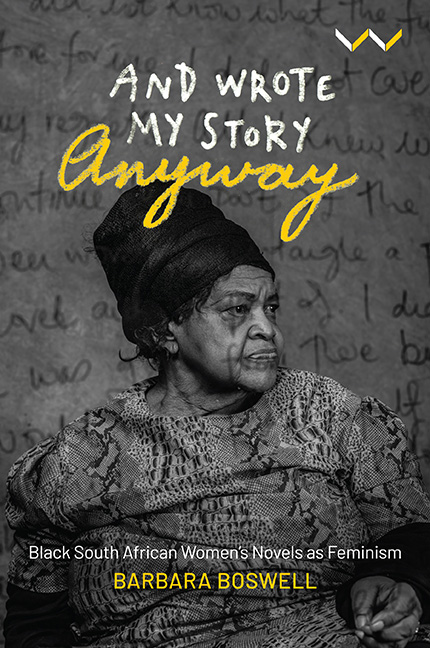Book contents
- Frontmatter
- Dedication
- Contents
- Acknowledgements
- Author's Preface
- Acronyms
- Introduction: ‘And Wrote My Story Anyway’: Black South African Women's Novels as Feminism
- 1 Writing as Activism: A History of Black South African Women's Writing
- 2 Rewriting the Apartheid Nation: Miriam Tlali and Lauretta Ngcobo
- 3 Dissenting Daughters: Girlhood and Nation in the Fiction of Farida Karodia and Agnes Sam
- 4 Interrogating ‘Truth’ in the Post-Apartheid Nation: Zoë Wicomb and Sindiwe Magona
- 5 Making Personhood: Remaking History in Yvette Christiansë and Rayda Jacobs's Neo-Slave Narratives
- 6 Black Women Writing ‘New’ South African Masculinities: Kagiso Lesego Molope and Zukiswa Wanner
- Conclusion: Towards a Black South African Feminist Criticism
- Select Bibliography
- Index
6 - Black Women Writing ‘New’ South African Masculinities: Kagiso Lesego Molope and Zukiswa Wanner
Published online by Cambridge University Press: 15 June 2021
- Frontmatter
- Dedication
- Contents
- Acknowledgements
- Author's Preface
- Acronyms
- Introduction: ‘And Wrote My Story Anyway’: Black South African Women's Novels as Feminism
- 1 Writing as Activism: A History of Black South African Women's Writing
- 2 Rewriting the Apartheid Nation: Miriam Tlali and Lauretta Ngcobo
- 3 Dissenting Daughters: Girlhood and Nation in the Fiction of Farida Karodia and Agnes Sam
- 4 Interrogating ‘Truth’ in the Post-Apartheid Nation: Zoë Wicomb and Sindiwe Magona
- 5 Making Personhood: Remaking History in Yvette Christiansë and Rayda Jacobs's Neo-Slave Narratives
- 6 Black Women Writing ‘New’ South African Masculinities: Kagiso Lesego Molope and Zukiswa Wanner
- Conclusion: Towards a Black South African Feminist Criticism
- Select Bibliography
- Index
Summary
In South African history, 1976 stands as the year when young black South Africans reignited the fight against apartheid with renewed vigour. The 1976 uprising started in Soweto on 16 June, when apartheid police lashed out at children protesting the introduction of Afrikaans as a compulsory medium of instruction in black schools. At least four children, including 13-year-old Hector Pieterson, were killed by police bullets, thus unleashing student protests across the country. In the ensuing violence, police killed over a thousand people – most of them children of school-going age. In its aftermath, South African police increasingly used the uprising as an excuse to target children in repressing anti-apartheid protests, since the youth had become the vanguard in protest action for a free South Africa. As in other historical eras, black women were uniquely affected, not only by this renewed phase of apartheid brutality but also by the protests that met increased state repression. Two years after the uprising, in a speech to commemorate Women's Day on 9 August, Makhosazana Njobe (1978, 12) described to exiled South Africans the conditions black women were facing inside the country:
Our women live in perpetual anxiety of husbands and children who disappear from homes, sometimes without trace. Our children are detained in solitary confinement without any change of clothes for days, some are cold bloodedly murdered; children of 7 years old are interrogated for hours, tortured and even made to appear in the racist courts of law as accused … In fact hundreds of them have their young and tender bodies riddled with bullets from the fascist police guns.
Apartheid's blatant brutality against children led a number of black South African women to leave the country and join Umkhonto we Sizwe (MK), the ANC's armed wing, which was engaged in armed struggle against the state. According to Thenjiwe Mtintso, an MK commander, a ‘sizeable amount’ (in Pillay 1992, 18) of women entered the army in 1976 in response to the uprising and subsequent massacre of children. Women soldiers would eventually make up about 20 per cent of MK's numbers (Pillay 1992). Young women who had witnessed the events of the 1976 uprising, or who were subsequently detained and tortured by police, led the influx into the armed wing of the ANC.
- Type
- Chapter
- Information
- And Wrote My Story AnywayBlack South African Women's Novels as Feminism, pp. 171 - 198Publisher: Wits University PressPrint publication year: 2021



